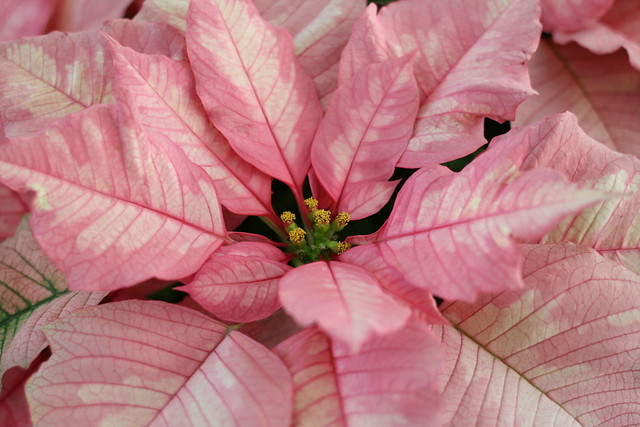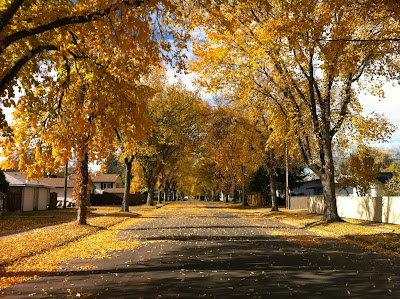As I was out and about today, I spied something. It's something I've seen in a few neighbourhoods. Do you see what I saw?
That house in the middle sure seems to have the jump on spring. Jarringly so, given the brown-ness of all the lawns and park surrounding it. Walk a couple more blocks, and there is another house, also seemingly well-tended to. I took a photo of his lawn compared to his neighbour's. Certainly seems like he knows his fertilizers.
But look a little more closely.
Do the edges of those blades of grass seem rather... square to you? A little too clean cut?
They should.
They're fake.
This is the fourth or fifth lawn I've seen in the last couple years made of artificial grass. And it's one of those things that just makes my brain go, "seriously? Really, seriously?" It continues to boggle my mind, some of the things we come up with that serve only to propel our self-centred little lives.
On the surface, I can see the appeal. Save time, energy and money by not having to mow, rake, weed, water, etc. Always have a beautifully manicured, lush-green lawn (because to be fair, I could not tell you where the fake lawns are in the middle of June--they blend in very well). And as
NewGrass.ca goes on to say, artificial grass also means no grass stains on kids' clothing, and apparently this stuff is "completely unaffected by snow or ice," so... presumably no snow mould?
Yes, some advantages.
But at what cost?
First of all, are you really saving money? I checked the Home Depot website. It's $189 for 50sq ft. Estimating my front and back yards combined to be about 1,000sq ft, that works out to nearly $4,000. NewGrass has a warranty of 8yrs, so let's say this grass lasts ten before needing replacement. So that works out to about $400/year that this grass is costing me.
Now, let's look at what real grass is costing me. I spend about $5 per summer on a jerry can of gasoline for my lawn mower. I'm supposed to tune up my lawn mower with an oil and filter change every year. I haven't thus far, but let's say I'm on the ball--that's about $50. I try to let as much rain as possible do the watering of my lawn for me, so for the last two summers, I've only had to use my sprinkler 2-3 times. I let it run for the recommended max of an hour each time. I'm not sure what volume of water this is, but knowing my overall water bill during the summer months, I'm guessing the lawn only soaks up $10-20 of that. Let's say $20. I spent $50 on ant and weed killer last year. And another $10 on grass seed to fill in the hole where the ants were. I need to aerate and fertilize, which will run an average of about $200.* So $335 altogether.
Sorry, who's saving money?
Artificial grass supporters would say the extra $65/year is worth it, simply for the convenience of not having to maintain a real lawn. Okay, just hold that thought.
Let's look at the cost to our earth. NewGrass claims their product is eco-friendly, because you save water by not having to irrigate, and because it's made of recycled and recyclable materials. Except... since when was real grass not eco-friendly? MY lawn makes oxygen, for Pete's sake! And while I know that the oxygen output of my lawn is probably not as significant as the tree on the boulevard in front of it--given the surface area of grass blades to elm leaves--my lawn still has its role to play. And not just in the oxygen cycle, but the water cycle, and overall circle of life.
Remove the grass from a lawn, and you've removed one more small piece from the ecological equation that holds our atmosphere together and keeps our climate in balance. Remove the grass from a bunch of lawns, or a few school fields, and it starts to add up to something. Something NOT eco-friendly.
Finally, let's look at the cost to our mental and physical well-being. I'm not sure how many calories a person burns by pushing a lawn mower, raking leaves and grass, pulling weeds, etc. But for me it seems to be enough that, in conjunction with my other favourite summer activities, I do not need to carve out extra time to be active, nor do I need to spend money on a gym membership (again, who's saving money?). I am also soaking up vitamin D from the sun, which is still the best way to get vitamin D.**
As an introvert, my lawn and garden work is valuable recharge time. Sure, I could just as easily recharge
with a book in my hammock, but remember, I'm also being physically active. That's two birds with one stone, people. Plus, the hammock is much more satisfying
after all that yard work.
Speaking of satisfying, what a sense of accomplishment and ownership when I maintain my own lawn. Such a heightened sense of competence from all the different aspects of lawn care I can do independently. I have learned so much over the last two summers about the
functioning of lawn mowers,
how weeds grow, the
process of edging, the benefits of
mulching... I could go on.
....What sense of pride and accomplishment does your extra $65 a year get you???
Socially, working in my front and back yards means I have a chance to connect with neighbours. It means I form a relationship with the "fertilizer guy", with my colleague's husband who will teach me how to change the mower's oil, with the greenhouse lady at Rona (I've gleaned her wisdom two years in a row, now). I'm building community.
There is one more aspect of our well-being affected here. When we lose our
interaction with nature, we lose our
connection to nature. And I'm not sure people realize
how important that connection to nature is. Interacting with nature is a sensory experience. I understand the stubbornness of getting grass stains out of jeans--but there is something children learn when they roll around in the grass and feel it under their skin, when they feel and see what it takes to hit the ground hard enough to make a grass stain, when it squishes under their shoes after the rain, in being close enough to the earth to smell it. I'm pretty sure ladybugs and earthworms and the things of childhood discovery don't roam around in fake grass. And while I can't paint all parents with the same brush, I just have this gut sense that those who put artificial grass on their lawns are not the kinds of parents spending all their 'extra time' camping out in nature with their children to give them the experiences they're missing at home. Just a hunch.
In the same way that children are losing their ability to identify where food comes from as they eat more and more processed meals, they will start to lose their understanding of the natural world, and how it influences so many other systems. There is something precious in fully participating with nature in the seasons--watching the change marked by each one. When your lawn stays the same all year.... it's just not natural.
And this connection with nature is not just valuable for children, you know. Who doesn't link carefree summer days with the smell of fresh-cut grass? Who's ever felt the cool relief of laying in the grass after running around in the heat? Do you ever use wet grass to wipe mud off your shoes? Ever watch a robin expertly pluck a worm from the depths of the front lawn? Have you ever grabbed that stray piece of wild grass that's just perfect for blowing like a trumpet? Or ever sat in a remote corner of a field, after a romantic picnic, in that first really deep conversation with a significant other, on the cusp of taking that relationship to the next level, all the while plucking blades of grass beside you to give your nervous hands something to do while the words stumble out of your mouth and you decide whether you can handle looking up from the grass into his eyes?
Okay, Gina, you're diving off the deep end, here. It's just a patch of grass.
Yes, but that's how anything harmful starts. As "just a patch" of something.
Artificial grass is just one more thing that feeds our selfish, individualistic desires. Someone who wants to save themselves a little bit of time and energy. But at the cost of further damaging an already-broken ecosystem, and depriving themselves--and possibly their children--of the natural experiences that contribute to physical, mental, social, and emotional well-being.
Seriously? Really, seriously?
*Though I'm getting aeration and fertilization done for nearly half of that this year.
**Yes, only when I am also responsible about sunscreen, which I generally am.














